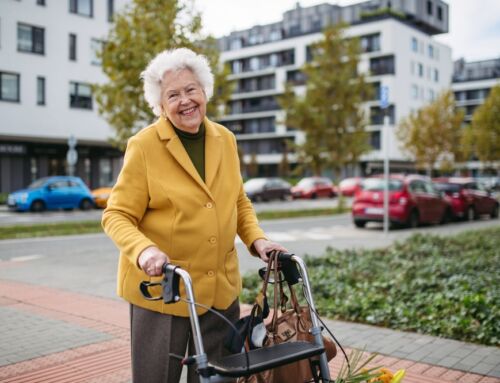We often discuss older adults’ reasons for delaying a senior living move. Some of the top justifications for putting off such a move include not wanting to deal with downsizing, not feeling “old enough” or “ready,” and concerns about cost. And as we wrote about last week, another key roadblock is a fear of losing independence. But what about the other side of the coin? What about those retirement community residents who often tell us “I wish I had moved sooner”?
>> Related: What’s Behind “I’m Not Ready Yet” for 55 Plus Community Prospects
Motivations behind decision-making
We wrote a blog a few years ago about the psychology around a senior living move. In that post, we explored humans’ decision-making processes and motivations as described by psychologist Abraham Maslow’s Hierarchy of Needs.
To understand Maslow’s theory, picture a pyramid. The bottom layers are comprised of your most basic human needs: forming the base of the pyramid, physiological needs (food, water, shelter, etc.), followed by safety needs (which keep us safe and healthy), belonging needs (family and friends), and then esteem needs like feeling appreciated and respected. Maslow referred to these as “deficit needs” or “d-needs,” which he posited must be fulfilled before a person can focus on any higher aspirations, or “being needs” (b-needs), like self-actualization.
In other words, Maslow theorized that individuals can’t reach their highest goals or pursue a meaningful life (b-needs) until their fundamental d-needs are met. What’s more, when these d-needs are not satisfied, it often results in feelings of anxiety and tension.
Additionally, Maslow explored how motivation and decision-making are interconnected. He introduced the concept of meta-motivation, which describes the drive of individuals who have moved past their basic needs and are continually seeking self-improvement and personal growth. These people are motivated by their b-needs rather than their d-needs.
>> Related: How Psychology Impacts Motivations Behind a Senior Living Move
Fulfilling your potential at a retirement community
So, how does Maslow’s Hierarchy of Needs relate to senior living decisions? Well, older adults who choose to move to a retirement community, such as a continuing care retirement community (CCRC or “life plan community”), are ensuring their fundamental or d-needs — such as shelter, safety, health, and social connections — will be met … both today’s needs and the unknown ones of the future. This allows them to shift their focus towards those aspirational b-needs, like the pursuit of personal fulfillment and growth.
Maybe that personal growth and freedom from stress inspires a retirement community resident to dive into a creative project, volunteer, spend more quality time with friends and loved ones, travel, learn a new skill, meet new friends, or pursue any other passion. This aligns with Maslow’s concept of meta-motivation, where individuals who are secure in meeting their basic needs are more driven to pursue higher-level aspirations.
And indeed, many retirement communities offer their residents numerous on- and off-campus activities to further support and enhance their journey towards personal growth and achievement of their full potential.
>> Related: Uniting The Emotional & The Rational In Senior Living Decisions
Making the leap and moving sooner
This brings us to a refrain we often hear in our visits to retirement communities across the country: “I wish I had moved sooner.” While many prospective residents may initially have apprehensions about making a senior living move, as discussed above, once new residents make that leap and get settled in, they often discover that not only were their fears unfounded, but they realize the positives of life in their new community actually exceed their expectations. Some even describe their move as “liberating,” giving them a fresh start to an easier lifestyle.
We recently heard from a CCRC resident who shares that there were several factors behind her and her husband’s anxieties about making their senior living move. Not only was her husband reluctant to leave their beloved home, but the couple also was concerned about the cost of living in the community. On the other hand, however, they were highly focused on finding a senior living option that would allow them to “age with dignity.”
Once they made their decision and moved, they did not look back, and in fact, they agreed that they should have done it sooner (for one, to lock into the CCRC at a lower price). This resident shares: “I moved in at the age of 63 (my husband was 68), and we were glad to have gone in while young and able enough to enjoy so many aspects of independent living. We swam each evening after dinner, went on CCRC trips, served on committees, and so much more. I have been in independent living for over 20 years and expect to continue to live in independent living for many more years.”
>> Related: 5 Reasons to Make Your CCRC Move Sooner Than Later
An even more compelling reason to move sooner
Another resident also shared his and his wife’s experiences with moving into a CCRC and some of the community’s benefits that may make people wish they’d moved sooner. “When the time came, we did not hesitate — and I am very glad we did take this important step,” this gentleman says.
He explains: “My wife and I moved into a CCRC in 2010. At the time, I was 71 and my wife was 64. I am quite happy to have made the move when we did; waiting until I was in my 80s, I would have found it much more difficult to adjust. We both quickly became involved in activities, developed friendships, and our lives are fuller than if we had waited.”
This resident’s story bolsters the idea that moving sooner rather than later to a CCRC can ensure your essential d-needs are met, freeing you to pursue your aspirational b-needs. His and his wife’s current situation only further cements this concept and confirms they make the right choice with their senior living decision.
He shares: “Now that my wife has dementia (our CCRC has a small memory unit, just five minutes’ walk from my apartment), I feel the support of others who have known us for years, and can provide genuinely intimate friendship and support. Our CCRC does not accept persons who are already symptomatic with dementia — so had we waited, we could not have moved in and would have had to manage this time of our lives with far less support.”
>> Related: Comfort, Convenience, Connection: The Key Benefits of a Retirement Community
The origins of “I wish I’d moved sooner”
There’s a common phenomenon among older adults who move to a retirement community in which they go from “I’m not sure about this” or “I’m not ready yet” to “I wish I had done this sooner.” Based on Maslow’s research, it is likely that at the heart of this psychological metamorphosis is a realization that many of the fears that were holding them back were actually unfounded. Once they get settled into their new home, they may even feel “liberated,” relishing the emotional freedom that comes with having your d-needs met so you can instead focus on your b-needs.
Of course this isn’t the case for every new retirement community resident. Unfortunately, there are situations in which a person is not happy in their new environment or the resident’s experience doesn’t match what they were “sold.” (We will delve into this topic in a future blog post.) But based on the conversations we’ve had with current residents, this is thankfully the exception rather than the rule.
The vast majority of retirement community residents appreciate the peace of mind and the freedom that came with their move — perhaps especially among CCRC residents. Not only do those living in a CCRC not have to worry about mundane things like lawn care and snow removal, they also have all of their d-needs met by the community, including access to care services, should they need them. Once a person attains this sense of peace and is released from so many of life’s anxieties, it’s easy to understand why one might think, “I wish I’d moved sooner”!

FREE Detailed Profile Reports on CCRCs/Life Plan Communities
Search Communities






